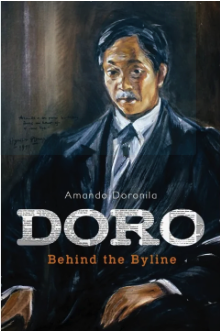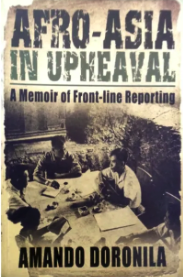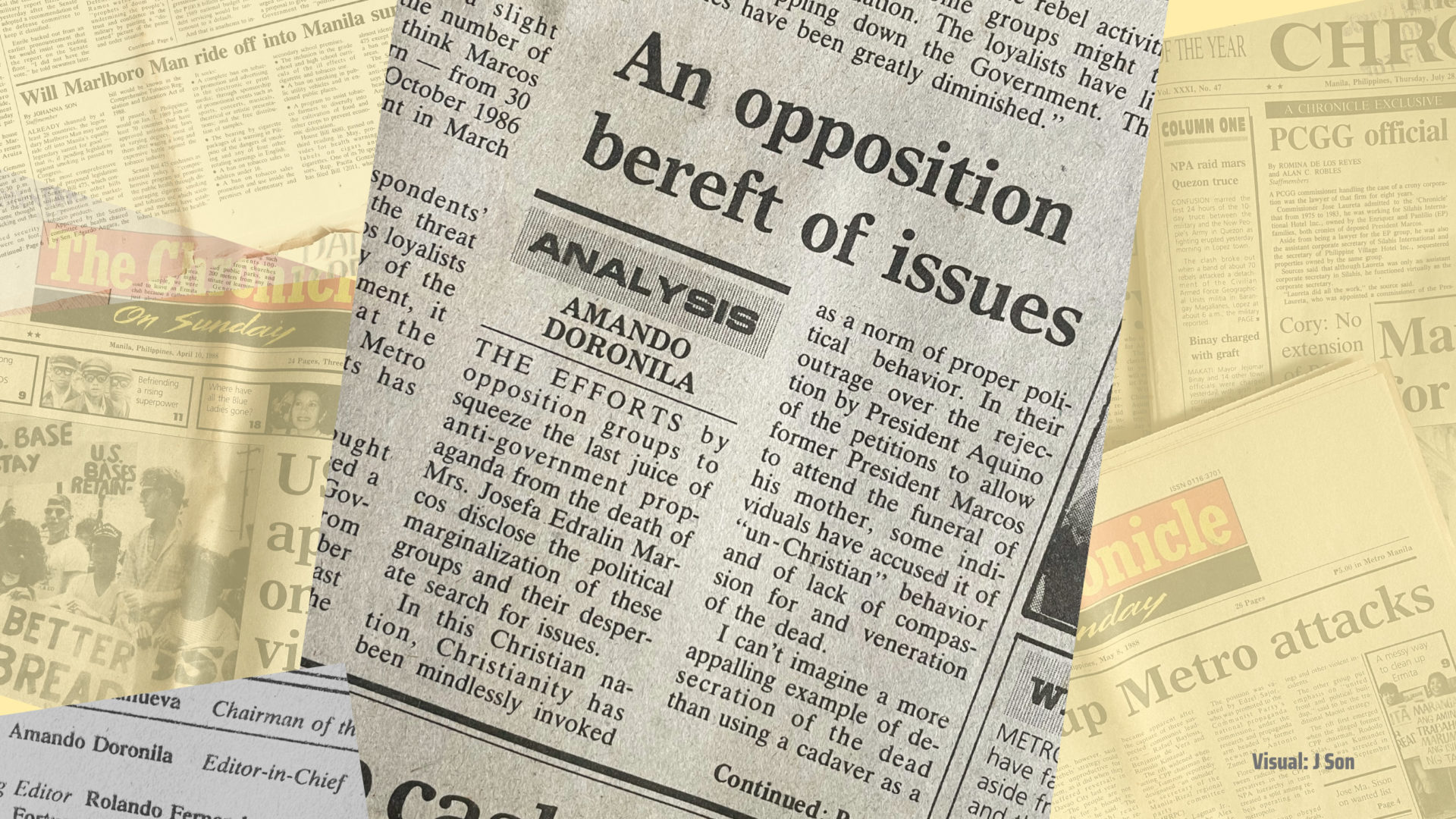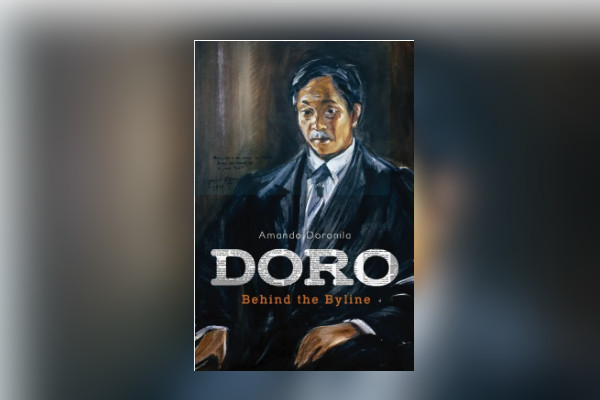
The clackity-clack of typewriters, the teleprinters spewing snake-like rolls of copy from foreign wire agencies, and reporters flopping their bags down on their desks and then immersing themselves straightaway into writing the news of the day.
These were everyday scenes at the ‘Manila Chronicle’ newsroom of nearly four decades ago. It was to this newsroom – not just the physical space but its feel and vibes – that I found myself transported back to on 8 July after reading an ex-colleague’s message that our editor-in-chief at the ‘Chronicle’, Amando Doronila, had passed away.
That newsroom was the setting I most remember Doro in, emerging from his room, tobacco pipe in hand (or sticking out through his teeth), clad in polo shirt with rolled-up sleeves and sauntering over for chat with an editor or another, a reporter or another.
The ‘Chronicle’ was the only newspaper newsroom I have been part of, and Doro was my first editor-in-chief. Fresh out of the University of the Philippines, I had just completed a degree in journalism two months after the 1986 ‘People Power’ Revolution. I had known for a long time that I wanted to write, but had no clue at that point that I could, or would, ever end up in news, a world that was so alien to me as a young Chinese Filipino.
Doro, who completed his earthly life at 95, has been described in many ways. But I found myself thinking – with introspection and hopefully some wisdom from more than three decades in news work – about what I learned from him and from being around him, during quite interesting times in Philippine history.
There is also the point, expressed too by other colleagues in Doro’s ‘Chronicle’ team, about appreciating what a true-blue newshound he was, particularly when seen against the backdrop of the polarised, at times muck-filled information spaces of today.
You could almost see Doro’s always curious mind processing information as he spoke to other people, whether interviewees or reporters in the office. Some of these chats, often about the latest political developments, were punctuated with ‘fkst!’ – an expression that was characteristically Doro’s.
I started out in the foreign news section, working with and learning from the news editor then, Rolando Fernandez. At some point, I began to do weekly book reviews. Then I moved to the national desk as a copy taker, typing out stories that reporters dictated from the field (using a blue Olivetti and a yellow rubber contraption to support my neck for hours on end). Then I became a subeditor, closing national-news pages. Later, I got assigned to cover the Senate (through historic events like its vote to terminate the agreement on the US bases in 1991 and the post-1986 attempted coups d’ etat) and then the foreign affairs beat.

When I think of Doro, I think of these lessons that have stayed with me:
One. The story is the story, and not the journalist. Let the information guide you, and do not let your ego get the better of you. In other words, it’s not about ‘me, me and me’ or ‘we, we, we’ (like news organisations that, in today’s selfie culture, can sound like publicity promoters for their editors or managers). Stay focused on the story by using the skill of professional news work, and let it speak for itself.
Two. What are your facts? How do you support you’re saying? Those make up the foundation of a story and are what make it fly, or fizzle out. Your story is only as good as your ability to put together a good case for it. In sum, do your homework.
Three. If the information, interviews, research do not support what you had thought you might find or argue for in your story, drop your original plan. Yes, even if you had a great headline for it, or a ready lead. That’s no-go territory.
Four. Keep writing, even when you are a veteran journalist or an editor. Seniority or experience in journalism doesn’t mean you should ‘graduate’ from, or stop, reporting or writing. Who said that all reporters ought to become editors (the two roles do not always involve interchangeable skills and some are better at one but struggle at the other), or columnists? Writing, reporting and analysing are core to the craft, and there is not one journalistic path. Indeed, Doro was always writing, not least in his long-running column, ‘Analysis’. What was to be one book of memoirs became two volumes, the first published in 2008 and second in 2022, although he had finished most of the material years back. The breadth of his books shows how much he valued, and kept, information and documentation.
These insights have stayed with me through the decades, shaped by experiences (mistakes included) in a topnotch newsroom and training ground led by Doro. As a journalist starting out back then, I was absorbing everything around me. The ‘Chronicle’ years also gave me another gift: the space to intuit that I found meaning in this profession and could, therefore, stay in it.

Looking back, Doro taught us not by making grand statements or snarling at the staff (as seen in movies around journalism) or talking down to others. He did so by living – and in the process showing us – a news work ethic that was professional and steeped in integrity, without fanfare and yes, still possible in a sometimes jaded profession.
“Kung nabasa mo na yung memoirs ni Doro, you’ll realise na he practiced investigative and accountability journalism even before natin nagamit ang terms na yun. (If you’ve read Doro’s memoirs, you’ll realise that he practiced investigative and accountability journalism even before we used those terms,” reflected Booma Cruz, one of the editors of his memoirs and an ex-‘Chronicle’ staffer who was Doro’s go-to and trusted researcher since the eighties. (The other editor was Vergel Santos, managing editor of the ‘Chronicle’ when Doro was its chief editor.)
“Parang lagi lang nag-iisip. Except siguro sa tabako niya, wine and cheese, simple lang si Doro,” (‘He just seemed to be thinking all the time. Except for his tobacco, wine and cheese, Doro was a simple person’) said Booma who, after the ‘Chronicle’. went on to join other news outlets, including Probe Productions, and is among the founders of Vera Files.
Doro often asked her to pop into his room and help him save the file he was writing in diskettes (both the 5 1/4-inch floppy disk and the 3.5 inch diskette). At times, when Booma was not around, I got to take on that role.
More bits and pieces of memory have nudged me in recent weeks. At one point, he asked me do some research on Mustapha Kemal Ataturk, who founded the independent Republic of Turkey from the ruins of the Ottoman Empire. I recall (but could be wrong after all these years) that it was for a planned book on Turkey’s and the Philippines’ experiences of political transformation. (He continued to write about Ataturk, and former Philippine President Manuel Quezon, in the ‘Philippine Daily Inquirer’, where he moved after the disruptive changes at the ‘Chronicle’ that led to its sale and closure later on.)
Many years later (perhaps in the mid-2000s), I saw him outside the Philippine Air Lines terminal just as I stepped out from the airport arrival hall. I hesitated before approaching him, wondering if he would remember me. He did, adding that he was waiting for his wife to arrive from overseas. (The staff also called her ‘Mrs Doro’.) As I left the airport, I remember thinking to myself, ‘Doro pa rin si Doro’ (Doro is still Doro). He could look intimidating with his eyebags that gave him something like a semi-scowl, but he had this almost shy look around him too.
Weeks after Doro’s birthday on 6 February this year, I texted a greeting to him through his son Augustine after another colleague, Margie Logarta, encouraged me to say hello. I saw that he had turned 95, meaning that he was about the age of my father, whom I lost not too long ago. Life teaches you that there there are things one must say, now, to someone who has made a mark on your life.
Would he remember me? I wondered again. Augustine returned with a reply – yes he does. Feeling like a newbie all over again, I sent over a link to show Doro the Southeast Asian news series that I look after. “He said that he remembers you very well and told me that you were a protege!” Augustine added.
Up until that point, I hadn’t quite described myself in that way. After all, I was a sub-editor and reporter in large and often-frenzied newsroom, with other senior editors around me, during those ‘Chronicle’ years. But if being a protege means someone who has absorbed and learned, and strives to use, life lessons from Doro’s newsroom, then I am indeed one of those – and there are among many more like me.
Amando Doronila’s memoirs (also on Lazada and Shopee)
Vol 1 | Afro-Asia in Upheaval, a Memoir of Front-Line Reporting
Vol 2 | Doro: Beyond the Byline (on Shopee and Lazada)
Listen to Doronila’s conversation with The Age in Melbourne, Australia.
*Johanna Son, who was with the ‘Manila Chronicle’ from 1986 to 1994, is the Bangkok-based editor and founder of the Reporting Asean series.
Her byline has appeared in the ‘Bangkok Post’ and ’Nikkei Asian Review’, among others. A media trainer as well, she has written four news tools and journalism books: ‘Reporting on a Stressed Planet: 16 Concepts’, ‘Online Journalism and Storytelling: A Training and Learning Kit’, ‘Gender on Our News Radar’ , ‘Reporting around ASEAN Issues: A Tip Sheet’ (foreword by former Philippine Foreign Secretary Roberto R Romulo). For more than two decades, Johanna was with IPS Asia-Pacific international news agency as its regional director and before that, correspondent and regional editor.
This article is also published here: https://www.reportingasean.net/amando-doronila-a-true-blue-newshound/



